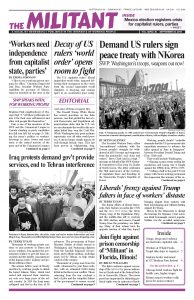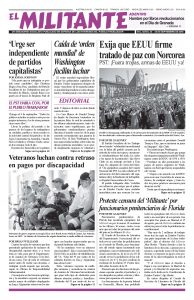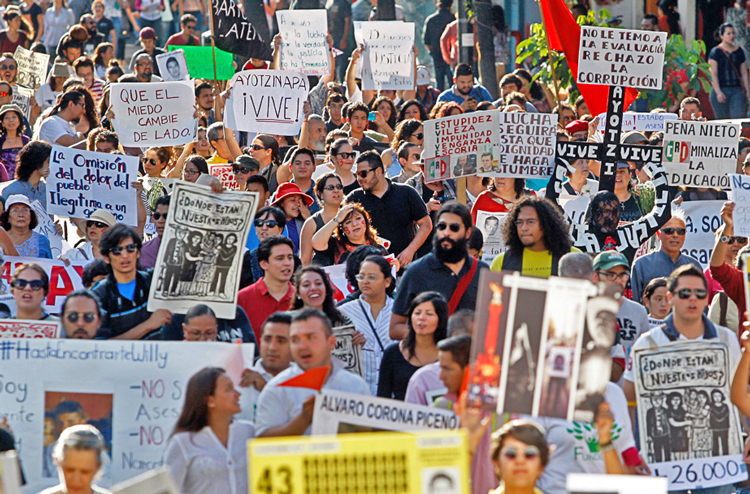![]() The government of Andrés Manuel López Obrador, who will be sworn in as the new president of Mexico Dec. 1, has already reached a trade pact with Washington, replacing the North American Free Trade Agreement. The deal was announced Aug. 27.
The government of Andrés Manuel López Obrador, who will be sworn in as the new president of Mexico Dec. 1, has already reached a trade pact with Washington, replacing the North American Free Trade Agreement. The deal was announced Aug. 27.
López Obrador, known by his initials AMLO, ran as an outsider, railing against the swamp of the traditional party establishments. For this reason, some bourgeois pundits called him the Donald Trump of Mexico. He promised to “root out” corruption; bring down pervasive crime, where 175,000 people have been killed in the last 10 years; and to put “the fatherland first.” He presented himself as an “agent of change” who will govern “for the benefit of everyone” while “the poor comes first.”
He won 53 percent of the vote, more than double that of his closest rival.
López Obrador ran on the Movement for National Regeneration (Morena) ticket, a party he formed in 2012, defeating the Institutional Revolutionary Party (PRI) and the National Action Party (PAN). Morena also won majorities in the legislature.
The Morena-led coalition government includes the small Labor Party, the conservative Social Encounter Party, and a throng of former high officials who had left the PRI and PAN.
Mexico’s rulers preside over one of the largest capitalist economies south of the Rio Grande. It has far and away the highest level of both exports and imports — $406 billion and $417 billion respectively — higher than Spain, Australia, Russia, Sweden, as well as far more than the second-place country in Latin America, Brazil.
Some of López Obrador’s opponents charge he will usher in a regime like Hugo Chavez’s in Venezuela, portraying him as an “enemy of the private sector and of the wealthy.” But when he was mayor of Mexico City from 2000 to 2005 he worked in partnership with capitalist ruling families there.
To win the trust of foreign capitalists and Mexico’s ruling families, he dropped calls he made earlier to repeal 2013 reforms that for the first time since 1938 allowed foreign firms to invest in the nationalized oil and gas industry.
Working-class discontent
López Obrador’s victory was a reflection of widespread discontent among working people and many in the middle class, and their disgust with business as usual. “This is going to be a peaceful, orderly change, but at the same time, it will be radical,” he claimed during the campaign.
The administration of outgoing President Enrique Peña Nieto — Mexican law allows the president just one six-year term — was mired in a series of corruption scandals. It was also marked by the disappearance and murder of 43 teaching students from Ayotzinapa in 2014 by police in collusion with drug gangs, which provoked widespread protests. López Obrador promised a new investigation, with a “truth commission.”
One bane of life for Mexican workers is the power and competition between capitalist cartels for control of the lucrative drug trade with the U.S. López Obrador told an Aug. 7 post-election meeting, “We cannot solve these violence problems with an iron fist and with more prisons.” But his campaign slogans of “hugs, not gunshots,” and “you can’t fight fire with fire,” provide no answer.
López Obrador’s promises to increase government spending on retirement, disability pensions and youth programs, to invest in infrastructure, and to provide financial support to small farmers, has gained support among working people.
One program, “Youth Building the Future,” which he announced July 4, would allocate $5 billion to pay wages for 2.6 million youth who will work as apprentices, a sweet deal for the bosses.
Support promised for capitalist rule
“The challenge for this administration is that we give it all our trust to turn Mexico into a paradise for investment,” López Obrador’s cabinet chief Alfonso Romo, a wealthy businessman, said Aug. 22.
Mexican multibillionaire telecom magnate Carlos Slim agreed, saying there are “no risks for his business” from the new presidency and praised plans for infrastructure and oil industry investments. Slim said López Obrador’s proposals to cut government spending were positive, “sober and austere.”
Cooperative relations between capitalists in the U.S. and Mexico are a high priority for the governments of both countries. Goods manufactured and exported from Mexico are equal to those from the rest of Latin America combined. Mexico recently surpassed Japan to become the second-largest exporter of auto parts to the U.S., and most flat-screen TVs sold in the U.S. are manufactured in Mexico.
The uptick in jobs and manufacturing in Mexico is one factor in the decrease in the number of Mexican workers entering the U.S. without work permits or visas.
For both the Trump administration and López Obrador, reaching a bilateral trade deal was a high priority. Trump had called NAFTA the “worst deal ever,” saying it favored Mexican and Canadian over U.S.-based companies.
The White House is using the agreement with Mexico to step up pressure on the Canadian government. As before, the trade agreement offers a protective barrier to competition from capitalists outside the hemisphere, while regulating which capitalists fare best inside the agreement. The U.S. bosses are demanding more favorable treatment.
To avoid tariffs under the new deal, cars sold in the U.S. must have at least 75 percent of their parts made in the U.S. or Mexico, up from 62.5 percent under NAFTA. This is aimed at keeping out parts from competitors in China and Asia.
U.S. and Mexican government figures have also said cooperation on immigration is expected to expand, an issue pushed by the U.S. administration. Washington is pressing Mexican officials to designate Mexico a “safe third country,” requiring migrants to seek asylum there if they enter that country seeking to get to the U.S.



